-
 Bitcoin
Bitcoin $82,824.9927
0.15% -
 Ethereum
Ethereum $1,812.0443
0.86% -
 Tether USDt
Tether USDt $0.9996
-0.01% -
 XRP
XRP $2.0531
1.26% -
 BNB
BNB $590.8048
0.24% -
 USDC
USDC $0.9999
0.00% -
 Solana
Solana $116.7059
-2.14% -
 Dogecoin
Dogecoin $0.1609
-2.09% -
 Cardano
Cardano $0.6477
0.87% -
 TRON
TRON $0.2377
1.97% -
 Toncoin
Toncoin $3.5900
-6.66% -
 UNUS SED LEO
UNUS SED LEO $9.4427
0.64% -
 Chainlink
Chainlink $12.8223
-0.83% -
 Stellar
Stellar $0.2611
1.72% -
 Avalanche
Avalanche $18.0751
0.35% -
 Sui
Sui $2.2399
-2.19% -
 Shiba Inu
Shiba Inu $0.0...01216
1.00% -
 Hedera
Hedera $0.1620
0.81% -
 Polkadot
Polkadot $4.0442
1.99% -
 Litecoin
Litecoin $83.2343
1.73% -
 MANTRA
MANTRA $6.4018
1.55% -
 Bitcoin Cash
Bitcoin Cash $299.5860
1.69% -
 Bitget Token
Bitget Token $4.4848
0.14% -
 Dai
Dai $1.0000
0.03% -
 Ethena USDe
Ethena USDe $0.9995
-0.03% -
 Monero
Monero $214.4863
0.12% -
 Hyperliquid
Hyperliquid $11.7593
-1.70% -
 Pi
Pi $0.5730
-12.73% -
 Uniswap
Uniswap $5.8248
-0.06% -
 Aptos
Aptos $5.0467
-0.83%
How does blockchain technology optimize the energy trading market?
Blockchain enhances energy trading by boosting transparency, efficiency, and security, while also facilitating renewable energy integration and P2P trading.
Mar 29, 2025 at 04:21 pm
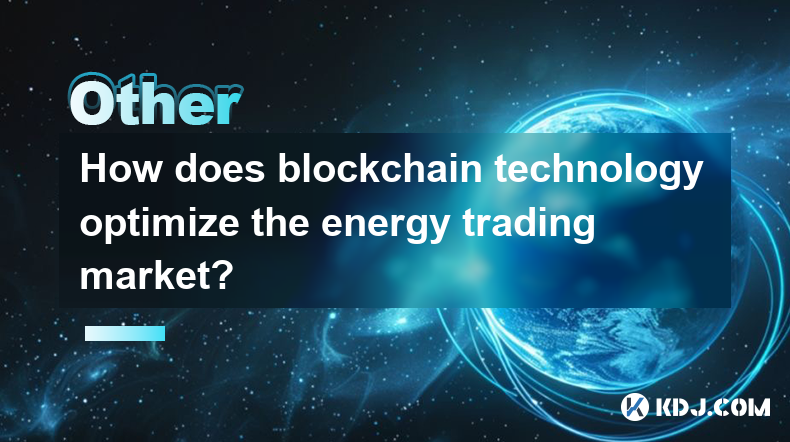
Enhancing Energy Trading with Blockchain: Transparency, Efficiency, and Security
Blockchain technology, with its inherent features of decentralization, transparency, and immutability, offers significant potential for optimizing the energy trading market. Its impact spans various aspects, from streamlining transactions to improving grid management and fostering renewable energy integration. This article explores how blockchain can revolutionize the energy sector.
One key area where blockchain excels is enhancing transparency in energy trading. Traditional energy markets often lack visibility into the entire supply chain. Blockchain creates a shared, immutable ledger, allowing all participants – producers, distributors, and consumers – to track energy generation, distribution, and consumption in real-time. This increased transparency builds trust and reduces the potential for fraud or manipulation.
Furthermore, blockchain significantly improves the efficiency of energy trading. Smart contracts, self-executing contracts with the terms of the agreement between buyer and seller directly written into lines of code, automate many aspects of the trading process, reducing reliance on intermediaries and accelerating transactions. This automation minimizes delays and administrative costs associated with traditional methods.
The decentralized nature of blockchain also enhances the security of energy transactions. By eliminating a central point of control, blockchain mitigates the risk of single points of failure and cyberattacks. The cryptographic security of the blockchain ensures the integrity and authenticity of energy transactions, reducing the likelihood of fraud and data breaches.
Blockchain facilitates the integration of renewable energy sources into the energy grid. By providing a transparent and secure platform for tracking renewable energy certificates (RECs), blockchain helps verify the origin and authenticity of renewable energy, encouraging its wider adoption. This also enables more efficient trading of RECs, incentivizing investment in renewable energy projects.
Peer-to-peer (P2P) energy trading is another promising application of blockchain. Blockchain-based platforms enable consumers to directly buy and sell energy among themselves, bypassing traditional utilities. This P2P model promotes energy independence, reduces reliance on centralized grids, and can facilitate the growth of microgrids and community-based energy systems.
The use of blockchain can also improve grid management and stability. Smart meters connected to a blockchain network can provide real-time data on energy consumption, enabling grid operators to better manage supply and demand, reducing the risk of blackouts and optimizing grid performance. This data-driven approach leads to more efficient resource allocation and improved grid stability.
Blockchain can also facilitate microgrid management. Microgrids, localized energy grids that can operate independently or connect to the main grid, benefit from blockchain's ability to track energy production and consumption within the microgrid, enabling efficient energy sharing and management among participants. This promotes energy resilience and independence at a local level.
Tracking carbon credits is another vital application of blockchain technology in the energy sector. Blockchain can provide a secure and transparent system for tracking and verifying carbon credits, ensuring their authenticity and preventing fraud. This is crucial for the effective implementation of carbon emission reduction programs.
Blockchain's impact extends to supply chain management within the energy sector. By tracking the movement of energy resources from production to consumption, blockchain provides increased visibility and traceability, reducing the risk of supply chain disruptions and improving overall efficiency. This also allows for better monitoring of environmental impacts.
Frequently Asked Questions
Q: What are the challenges of implementing blockchain in energy trading?
A: Challenges include scalability issues, regulatory uncertainty, the need for widespread adoption across the energy sector, and the integration with existing energy infrastructure. Addressing these challenges requires collaboration between industry stakeholders, regulators, and blockchain developers.
Q: How secure is blockchain technology in the context of energy trading?
A: Blockchain's cryptographic security mechanisms make it highly resistant to fraud and data breaches. The decentralized nature further enhances security by eliminating single points of failure. However, the security of a blockchain system also depends on the implementation and the security practices adopted by its users.
Q: What are the potential benefits of using smart contracts in energy trading?
A: Smart contracts automate transactions, reduce costs, increase efficiency, and enhance transparency. They also facilitate the execution of complex agreements with greater certainty and speed compared to traditional methods.
Q: How does blockchain improve the integration of renewable energy sources?
A: Blockchain provides a transparent and secure platform for tracking renewable energy certificates (RECs), making it easier to verify the origin and authenticity of renewable energy, encouraging investment and adoption.
Q: Can blockchain truly solve all the problems in the energy trading market?
A: While blockchain offers significant potential for optimizing the energy trading market, it is not a panacea. It's a powerful tool that can address many issues, but its successful implementation requires careful planning, collaboration, and addressing the technological and regulatory challenges.
Q: What are some examples of existing blockchain projects in the energy sector?
A: Several companies and organizations are exploring and implementing blockchain solutions in the energy sector. These include projects focused on P2P energy trading, carbon credit tracking, and supply chain management. Specific examples vary and are constantly evolving.
Q: What role do regulatory frameworks play in the adoption of blockchain in energy?
A: Clear and supportive regulatory frameworks are essential for the widespread adoption of blockchain in the energy sector. Regulations need to address issues such as data privacy, security, and the legal enforceability of smart contracts to foster trust and confidence in blockchain-based energy trading platforms.
Disclaimer:info@kdj.com
The information provided is not trading advice. kdj.com does not assume any responsibility for any investments made based on the information provided in this article. Cryptocurrencies are highly volatile and it is highly recommended that you invest with caution after thorough research!
If you believe that the content used on this website infringes your copyright, please contact us immediately (info@kdj.com) and we will delete it promptly.
- As SHIB and PEPE Holders Seek Stability, RCO Finance Emerges as a Hedge
- 2025-04-04 07:35:11
- Cango Sells Its China Operations for $351.94 Million, Pivoting Towards Cryptocurrency Mining
- 2025-04-04 07:35:11
- Cango Inc. Pivots to Bitcoin Mining, Exiting the Chinese Auto-Financing Market
- 2025-04-04 07:30:11
- Crypto analyst CasiTrades has provided a roadmap for the XRP price
- 2025-04-04 07:30:11
- In the world of AI and blockchain, where buzzwords often outpace actual innovation, Intellex stands apart
- 2025-04-04 07:25:13
- Stablecoins shifted their weight in Q1, flowing into a new set of chains
- 2025-04-04 07:25:13
Related knowledge

What are the future development trends of blockchain game development?
Apr 03,2025 at 05:00am
Blockchain technology has revolutionized various industries, and gaming is no exception. As we look to the future, several trends are set to shape the development of blockchain games. These trends not only promise to enhance the gaming experience but also to integrate blockchain technology more seamlessly into the gaming ecosystem. Let's explore these t...

What are the maintenance costs of blockchain system development?
Apr 03,2025 at 06:07pm
The maintenance costs of blockchain system development are multifaceted and depend on various factors. These costs can include technical maintenance, security updates, infrastructure expenses, and personnel costs. Understanding these elements is crucial for anyone planning to develop or maintain a blockchain system. Technical MaintenanceTechnical mainte...
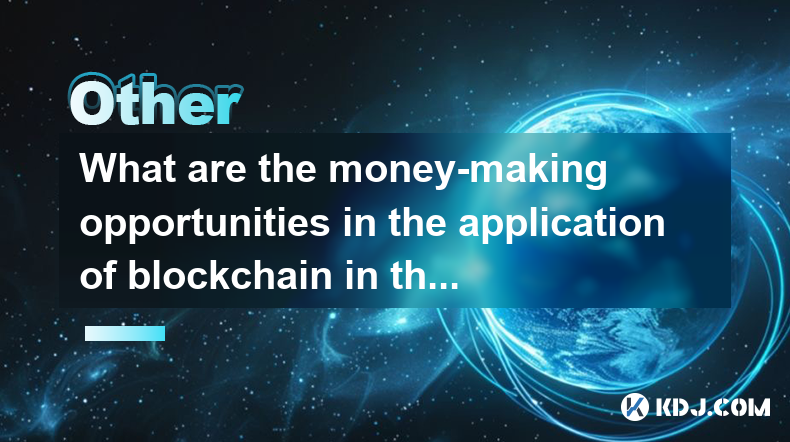
What are the money-making opportunities in the application of blockchain in the medical industry?
Apr 03,2025 at 03:35am
The integration of blockchain technology into the medical industry presents a myriad of money-making opportunities that can revolutionize healthcare systems. Blockchain's inherent characteristics, such as transparency, security, and immutability, make it an ideal solution for various medical applications. By leveraging blockchain, companies can develop ...
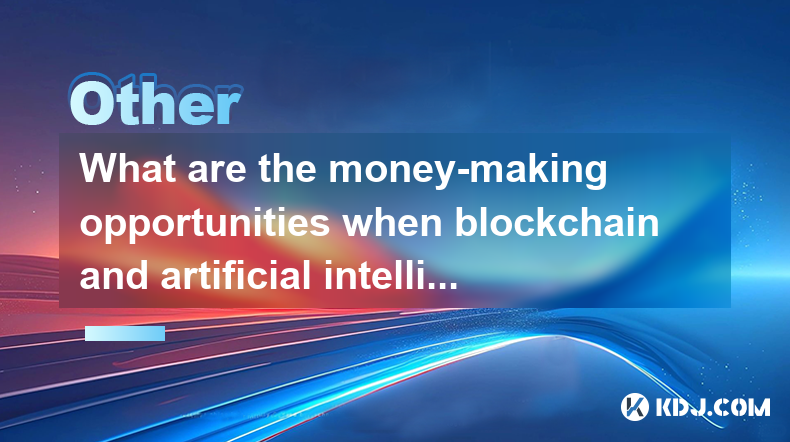
What are the money-making opportunities when blockchain and artificial intelligence are combined?
Apr 04,2025 at 01:28am
The convergence of blockchain and artificial intelligence (AI) presents a myriad of money-making opportunities within the cryptocurrency circle. This fusion leverages the decentralized and secure nature of blockchain with the analytical prowess of AI, creating innovative solutions and platforms that can generate significant revenue. From enhancing tradi...
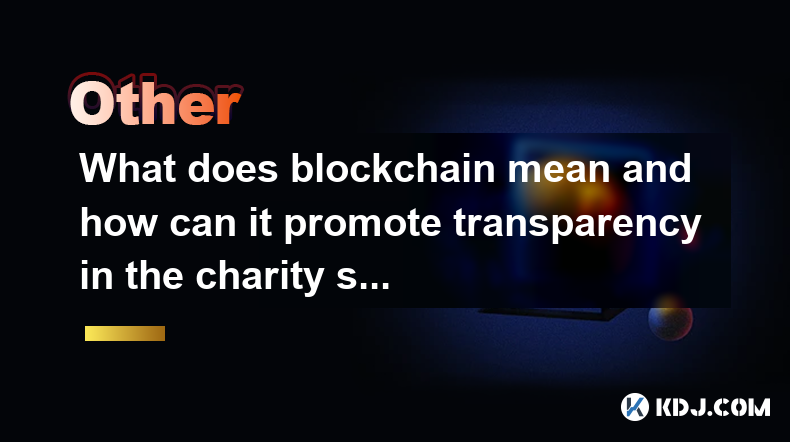
What does blockchain mean and how can it promote transparency in the charity sector?
Apr 03,2025 at 08:29pm
Blockchain technology is a decentralized, distributed ledger that records transactions across numerous computers. This ensures that the data is transparent and nearly impossible to alter retroactively. Essentially, blockchain serves as a digital ledger of all cryptocurrency transactions, enabling secure and direct exchanges without the need for intermed...
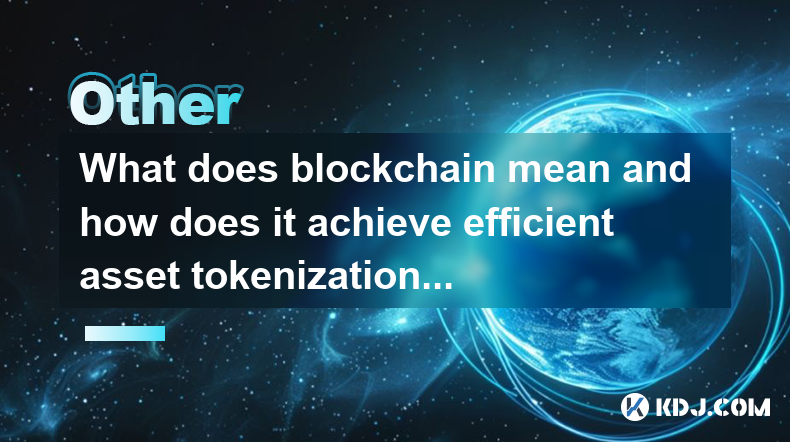
What does blockchain mean and how does it achieve efficient asset tokenization?
Apr 03,2025 at 07:57pm
Blockchain technology is a decentralized, distributed ledger that records transactions across numerous computers. It ensures that each transaction is secure, transparent, and immutable. The concept of blockchain was introduced with the launch of Bitcoin in 2009, but its applications have since expanded far beyond cryptocurrencies. At its core, blockchai...

What are the future development trends of blockchain game development?
Apr 03,2025 at 05:00am
Blockchain technology has revolutionized various industries, and gaming is no exception. As we look to the future, several trends are set to shape the development of blockchain games. These trends not only promise to enhance the gaming experience but also to integrate blockchain technology more seamlessly into the gaming ecosystem. Let's explore these t...

What are the maintenance costs of blockchain system development?
Apr 03,2025 at 06:07pm
The maintenance costs of blockchain system development are multifaceted and depend on various factors. These costs can include technical maintenance, security updates, infrastructure expenses, and personnel costs. Understanding these elements is crucial for anyone planning to develop or maintain a blockchain system. Technical MaintenanceTechnical mainte...

What are the money-making opportunities in the application of blockchain in the medical industry?
Apr 03,2025 at 03:35am
The integration of blockchain technology into the medical industry presents a myriad of money-making opportunities that can revolutionize healthcare systems. Blockchain's inherent characteristics, such as transparency, security, and immutability, make it an ideal solution for various medical applications. By leveraging blockchain, companies can develop ...

What are the money-making opportunities when blockchain and artificial intelligence are combined?
Apr 04,2025 at 01:28am
The convergence of blockchain and artificial intelligence (AI) presents a myriad of money-making opportunities within the cryptocurrency circle. This fusion leverages the decentralized and secure nature of blockchain with the analytical prowess of AI, creating innovative solutions and platforms that can generate significant revenue. From enhancing tradi...

What does blockchain mean and how can it promote transparency in the charity sector?
Apr 03,2025 at 08:29pm
Blockchain technology is a decentralized, distributed ledger that records transactions across numerous computers. This ensures that the data is transparent and nearly impossible to alter retroactively. Essentially, blockchain serves as a digital ledger of all cryptocurrency transactions, enabling secure and direct exchanges without the need for intermed...

What does blockchain mean and how does it achieve efficient asset tokenization?
Apr 03,2025 at 07:57pm
Blockchain technology is a decentralized, distributed ledger that records transactions across numerous computers. It ensures that each transaction is secure, transparent, and immutable. The concept of blockchain was introduced with the launch of Bitcoin in 2009, but its applications have since expanded far beyond cryptocurrencies. At its core, blockchai...
See all articles






















































































